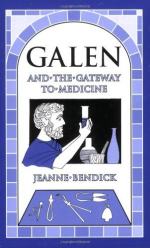|
This section contains 918 words (approx. 4 pages at 300 words per page) |

|
Galenic medicine (also called humoralism or Galenism) derives its name from the Greek physician and philosopher Galen (129–c.216C.E..). Galen's prolific writings were rooted in the Hippocratic corpus as well as the philosophical doctrines of Plato, Aristotle, and the Stoics. Medicine was identified with Galenism for 1,300 years, and was institutionalized in the European universities of the eleventh century after Arabic translations of Galen's writings were retranslated into Latin. Though Galenism was eclipsed in Europe by the rise of modern medicine, it still survives as Unani (Greek) medicine in some parts of India and Pakistan.
The foundation of modern medicine rests on the divorce of medicine from philosophy, two disciplines wedded in Galenism. Both philosophy and medicine were practical arts that sought to answer the Socratic question: How should a person live the good life? (Hadot 2002). The good life demanded a striving toward excellence (arête...
|
This section contains 918 words (approx. 4 pages at 300 words per page) |

|


